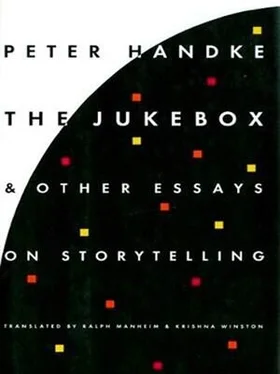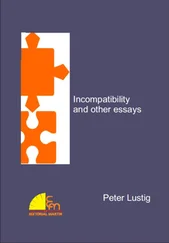The form of the music boxes was a story in itself. Through its form, the jukebox was supposed to stand out “from its not always very colorful surroundings.” The most important man in the company was therefore the designer; while the basic structure for a Wurlitzer was a rounded arch, Seeburg as a rule used rectangular cases with domes on top. The principle seemed to be that each new model could deviate from the previous one only so much, so that it was still recognizable. This principle was so firmly established that a particularly innovative jukebox, shaped like an obelisk, topped not by a head or a flame but by a dish containing the speaker, which propelled the music up toward the ceiling, proved a complete failure. Accordingly, variation was confined almost exclusively to the lighting effects or to components of the frame: a peacock in the middle of the box, in constantly changing colors; plastic surfaces, previously simply colored, now marbled; decorative moldings, once fake bronze, now chromed; arched frames, now in the form of transparent neon tubes, filled with large and small bubbles in constant motion, “signed Paul Fuller”—at this point the reader and observer of this history of design finally learned the name of its main hero and realized that he had always unconsciously wanted to know it, ever since he had first been overcome with amazement at encountering one of these mighty objects glowing in all the colors of the rainbow in some dim back room.
The bus ride from Burgos to Soria went east across the almost deserted meseta . Even with all the empty seats, it seemed as though there were more people together on the bus than anywhere outside in those barren highlands. The sky was gray and drizzly, the few fields between cliffs and clay lay fallow. With a solemn face and dreamy, wide-open eyes, a young girl ceaselessly cracked and chewed sunflower seeds, something often seen in Spanish movie theaters or on promenades; the husks rained to the floor. A group of boys with sports bags kept bringing new cassettes to the driver, who willingly broadcast their music over the loudspeakers mounted above every pair of seats, instead of the afternoon radio program. The one elderly couple on the bus sat silent and motionless. The husband seemed not to notice when one of the boys unintentionally jostled him every time he went up front; he put up with it even when one of the young fellows stood up while talking and stepped into the aisle, leaned on the back of the old man’s seat, and gesticulated right in his face. He did not stir, did not even shift his newspaper to one side when the edges of the pages curled in the breeze created by the boy’s gestures. The girl got off the bus and set out alone over a bleak knoll, her coat drawn close around her as she headed across a seemingly trackless steppe without a house in sight; on the floor beneath her vacated seat lay a heap of husks, not as big as one would have expected.
Later the plateau was punctuated by sparse oak groves, the trees small like shrubs, the withered leaves trembling grayish in the branches, and, after an almost unnoticeable pass — in Spanish the word was the same as for harbor, as the traveler learned from his pocket dictionary — which formed the border between the provinces of Burgos and Soria, came plantations of gleaming brown pines rooted atop cliffs, many of the trees also torn from their bit of soil and split, as after a storm, whereupon this closeness on either side of the road immediately gave way again to the prevailing barren landscape. At intervals the road was crossed by the rusted tracks of the abandoned rail line between the two cities, in many places tarred over, the ties overgrown or completely invisible. In one of the villages, out of sight of the road beyond rocky outcroppings — which the bus turned onto and from which, now even emptier, it had to return to the road — a loose street sign banged against the wall of a house; through the window of the village bar, the only thing visible, the hands of cardplayers.
In Soria it was cold, even colder than in Burgos, and bitter cold in comparison to San Sebastián down there by the sea, where he had come into Spain the previous day. But the snow he had been hoping for as a sort of companion to his undertaking did not fall; there was drizzle instead. In the drafty bus station he immediately noted down the times of departure for Madrid, or at least Zaragoza. Outside, on the main road at the edge of the town, between smaller tumbledown houses, shells of high-rises, and the rock-strewn steppe (which otherwise appealed to him), tractor-trailer trucks that seemed coupled together, all with Spanish license plates, thundered past, their wheels splattering a film of mud. When he caught sight of an English marker among them, and then the slogan on the canvas cover that he could understand at a glance, without having to translate it first, he felt for a moment almost at home. Similarly, during a longish stay in just such a foreign Spanish town, where no one knew any other language and there were no foreign newspapers, he had sometimes taken refuge in the only Chinese restaurant, where he actually understood even less of the language but felt safe from all that concentrated Spanish.
It was beginning to get dark, and outlines were blurring. The only highway signs pointed to distant capitals such as Barcelona and Valladolid. So he set out down the street with his heavy suitcase — he had been traveling a long time and had intended to stay in Soria into the New Year. He had found several times that the centers of these Spanish towns, which at first glance seemed almost invisible, were somewhere down below, beyond steppe-like stretches without houses, hidden in the valleys of dried-up rivers. He would stay here at least for the night; this once — he actually felt it as a sort of obligation — he had to get to know the place, now that he was here, and also do it justice (although at the moment, shifting his suitcase from one hand to the other every few steps and trying to avoid bumping into the natives, just beginning their evening ritual of strutting along, straight ahead, he did not succeed), and besides, as far as his “Essay on the Jukebox” was concerned, and in general, he had time, as he told himself now, as often before, in this instance using a verb from the Greek, borrowed from his reading of Theophrastus: s-cholazo, s-cholazo.
Yet all he could think of was running away. For his project, one friend or another had offered him, who for some years now had been roaming about without a home, his second apartment or third house, standing empty as winter came on, with silence all around, at the same time in a familiar culture, above all with the language of his childhood, which stimulated (and at the same time soothed) him right there on the horizon, to be reached at any time on foot. Yet his thought of running away did not include going back to where he came from. German-speaking surroundings were out of the question for him now, as was, for example, La Rochelle, with French, which was like second nature to him, where a few days ago he had felt like a stranger in the face of the wide Atlantic, the squat, pastel houses, the many movie theaters, the depopulated side streets, the clock tower by the old harbor that reminded him of Georges Simenon and those of his books that were set there. Not even San Sebastian with its much warmer air and clearly visible semicircular bay on the often turbulent Bay of Biscay, where just a short while ago, before his eyes, the floodwaters had surged upstream at night along the banks of the Basque Urumea River — while in the middle the current had flowed toward the sea — and in a bar, unlit and cold, as if it had been out of operation for years, stood a jukebox, made in Spain, clumsy, almost without design. Perhaps it was a compulsion in him that he forbade himself to run away, to retrace any of his steps, permitting himself only to move on, ever onward across the continent — and perhaps also a compulsion that now that he found himself without obligations and commitments, after a period of being much in demand, he felt that to get started on writing he had to subject himself, if writing was to have any justification at all, to barely tolerable, inhospitable conditions, to a marginal situation that threatened the very basis of daily life, with the added factor that, along with the project of writing, a second project had to be essayed: a sort of investigation or sounding out of each foreign place, and exposure of himself, alone, without benefit of teachers, to a language that at first had to be as unfamiliar as possible.
Читать дальше












